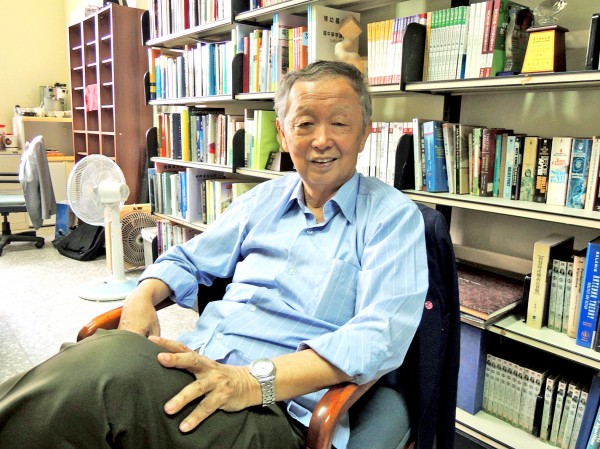《TAIPEI TIMES 焦點》 Former university head slams education program

Presidential adviser and former National Chi Nan University president Lee Chia-tung speaks during an interview in Hsinchu County on Wednesday. Photo: Hung Mei-hsiu, Taipei Times
POTENTIAL EINSTEINS: Lee Chia-tung said students needed to be able to pick a school that suited their style and competitiveness was suffering in the nation
By Hung Mei-hsiu and Jason Pan / Staff reporter, with staff writer
Presidential adviser and former president of National Chi Nan University Lee Chia-tung (李家同), last week expressed anger over what he described as turmoil and confusion created by government policies on the 12-year compulsory education program.
“The whole thing is a folly. It is diminishing competitiveness in Taiwanese students,” Lee said as he urged top education ministry officials to apologize and admit that it was a big mistake.
He said the reforms for the 12-year compulsory education program did not achieve the goals of abolishing the joint entrance exams, enabling students to attend nearby schools and offering courses catering to students’ interests, among other main objectives.
“Not only are the objectives contradictory to each other, but none of the goals were met. We now pile more pressure on students to get into top-rated schools, while students are also being categorized into different ranks,” Lee said.
“Students still have to take a number of assessment examinations as a group. In past years, students were able to get into either senior-high or vocational-high schools based only on their academic performance during the whole school year, without the joint exams,” he added.
“Education policies in the past also gave consideration to vocational training. Students who are not academically gifted could attend vocational schools. However, now they are forced to specify the schools they want to attend and many cannot get vocational training,” he said.
“This is not cultivating the skills needed for trades in the nation,” he added.
Ministry officials tried various ways to mitigate the intense competition to get into the limited spaces in top-rated schools, but the result has been the opposite, Lee said.
“To change this, they created another ‘special examination’ which became a monster. These star schools can set their own rules and conditions, with no regard for students engaging in volunteer work, participating in civic organizations or developing a balanced set of personal interests. It has turned into a ‘backdoor way’ for some parents to get their kids into star schools,” Lee said.
He said that the ministry wanted the traditional system of “elite education” to continue, but also wanted to have equality for all students.
“These two are at odds and heading in separate, but parallel, directions,” Lee said.
“Now we see top-ranked students who have put down 50 choices for schools they want to attend as required, but have ended up unable to go to any of them. So they have to go for the ‘special examination,’ which is intensely competitive. So the students end up battling each other and their rights are trampled,” Lee said.
He said he has been involved in work to help students in remote villages and rural areas.
“Students there do not care about their marks, but only think about if they are happy or not. However, after growing up, they discover their lack of competitiveness is a big impediment. Now, competitiveness is being killed off by these education ministry officials,” he said.
Lee said he advocates going back to the old system, and supports the existence of star schools.
“Each person is different; some students can pick up more difficult material. Why can our schools not provide them with learning support, special access and resources? Not everyone is an Einstein, but we must have schools to teach the potential Einsteins,” he said.
新聞來源:TAIPEI TIMES
















